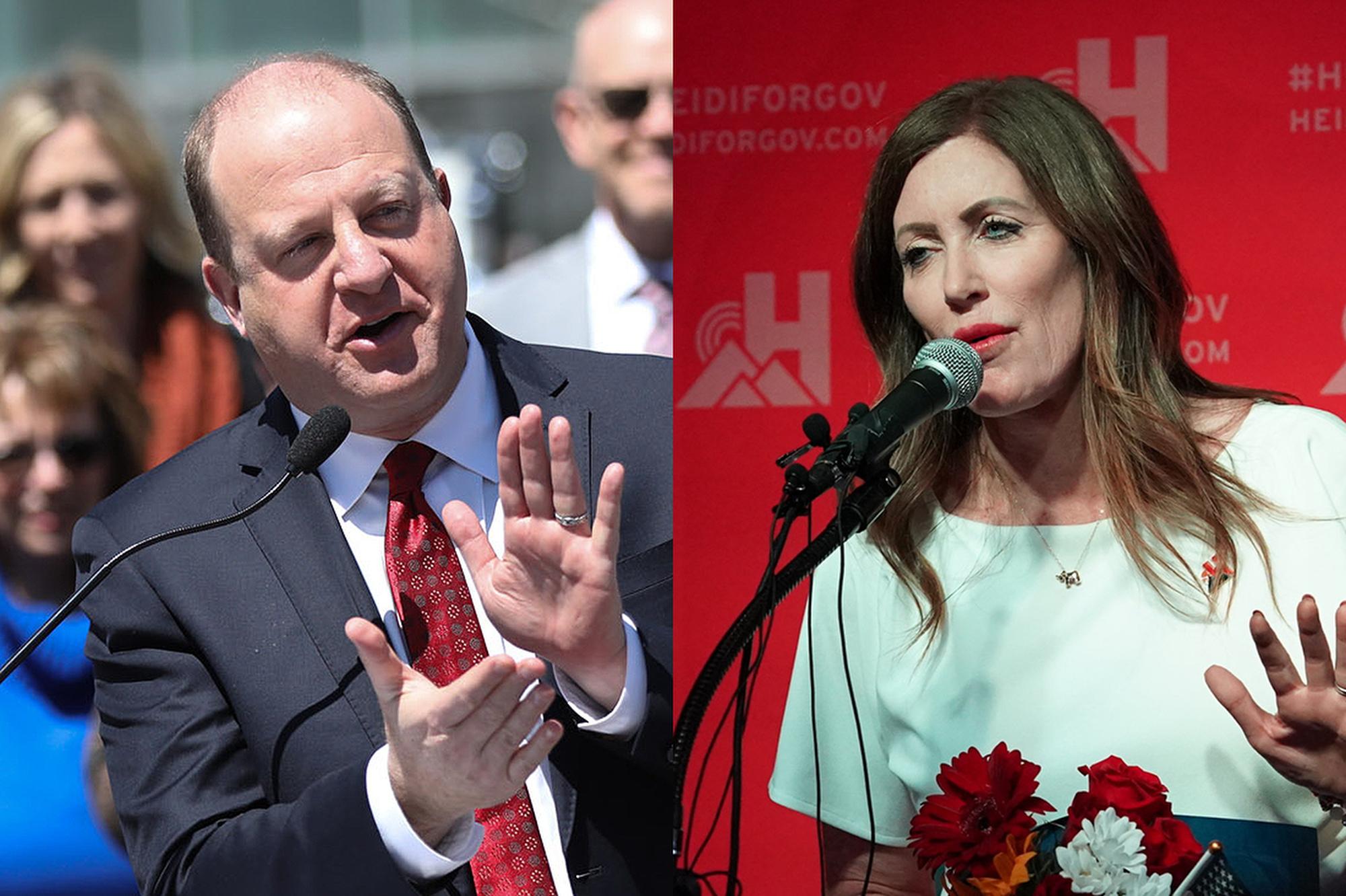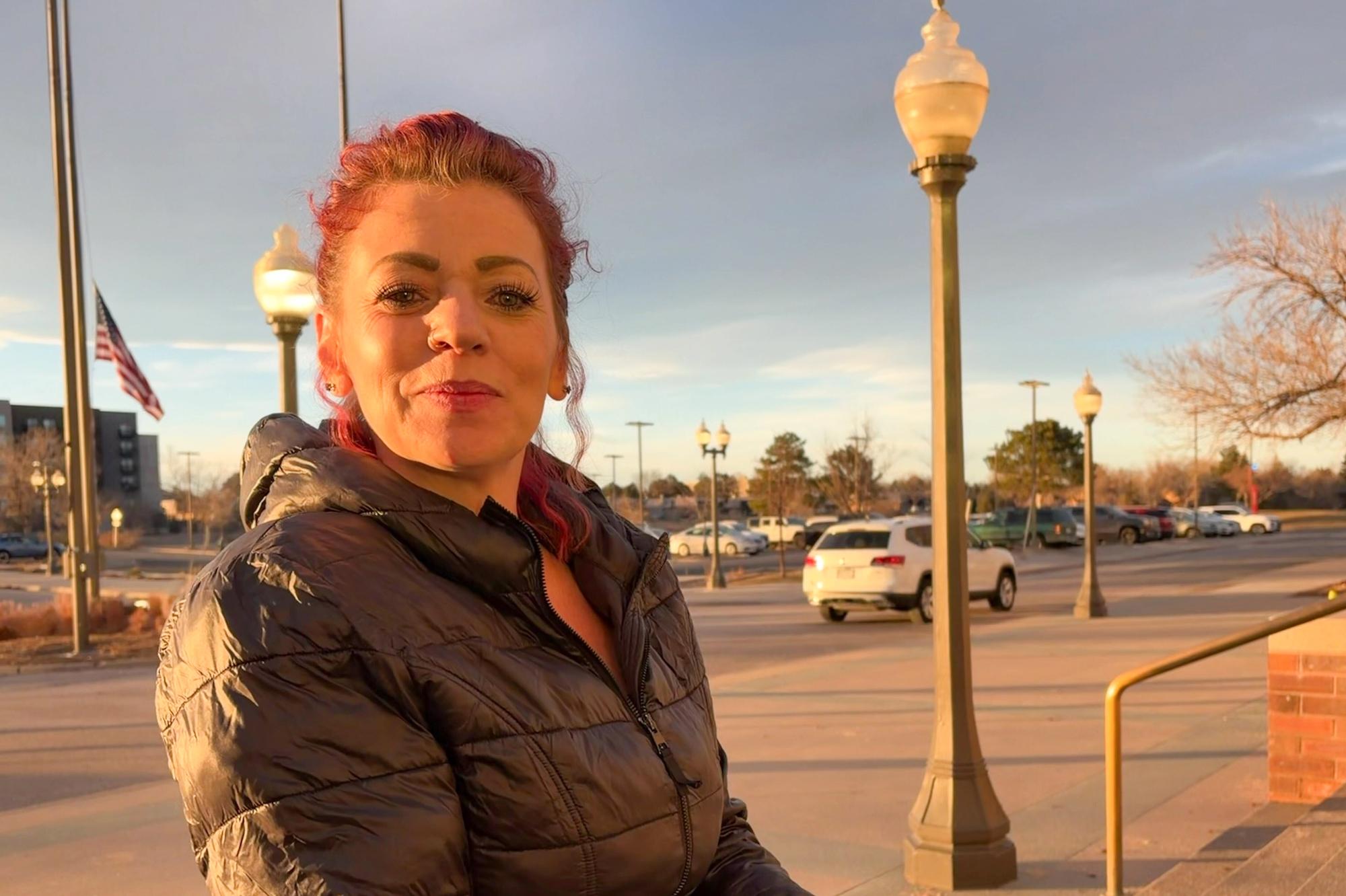
The race for the governorship in Colorado hit its fastest pace yet with two debates between Democratic incumbent Gov. Jared Polis and his challenger, Republican Heidi Ganahl in the past week.
A Thursday debate was hosted by The Colorado Sun and CBS4 in Denver, while another on Sunday was hosted by The Colorado Springs Gazette, Colorado Politics, KOAA News5 and The El Pomar Foundation’s Forum in Colorado Springs.
The candidates covered much of the same ground as in their first debate in September — especially crime, fentanyl and the cost of living — and revealed some new details of their policies. Here are a few new points that stood out.
Neither candidate supports a major affordable housing initiative.
Housing affordability looms large as living costs continue to rise — but neither of the two candidates spoke in favor of Proposition 123, which aims to pump nearly $300 million a year into affordable housing projects and related efforts.
“I’m skeptical that more money will solve the problem, but I’ll honor the will of the Colorado voters,” Polis said on Sunday.
Prop. 123 doesn’t directly raise taxes, but it reduces the size of TABOR refunds that will be paid in surplus years. In years without refund checks, the legislature would have to find money from the general fund.
“I don’t think the Colorado voters will approve giving their TABOR refunds back to make such a tiny dent in the housing issues,” Ganahl said.
Both candidates want to see local governments change their regulations, including zoning codes, to allow more development of housing. Polis has described it as a central focus of his second term.
Ganahl accused Polis of adding to the cost of housing, saying on Thursday: “Polis is the problem. He’s added tremendous amounts of regulations, fees and taxes.”
Polis challenged her to identify “anything that the state has added to the cost of housing,” adding that they “both agree” that local governments, rather than the state, are creating the regulatory burden.
Ganahl pointed to families recovering from the Marshall Fire, saying that Polis’ “onerous Green New Deal policies” had increased the cost to build a home in the burn area.
But as Polis pointed out, building codes are set by local governments. Both Louisville and Superior have strict green building codes, but those are now optional for fire victims.
Ganahl tempered her opposition to abortion.
In both debates, Ganahl tried to neutralize the issue of abortion — and her previous comments about restricting abortion access.
She opposes abortion rights, with some exceptions, and her campaign website says she’ll “do everything in her power” to repeal the state’s “disgusting” law that recently codified abortion rights.
But recently, Ganahl has said she actually would not make any direct changes to the state’s abortion laws.
“I’ve made a pledge that any changes to abortion law will go to a vote of the people of Colorado,” she said. “I will not sign it. I will put it back to a vote of the people of Colorado to make sure this issue does not divide us anymore.”
Colorado voters have rejected several anti-abortion measures in recent years. And Democrats will likely hold onto at least one chamber in the legislature, making it unlikely that lawmakers will pass any restrictions on abortion in the next two years.
On Thursday, Polis didn’t take a firm position on one liberal priority: restoring government funding for abortion care services.
“For any particular initiative that comes forward, like anybody, I'd want to read it and understand what it does before I say I support it or I oppose it,” he said.
But he noted that he had voted in Congress against the Hyde Amendment, which bans federal funding for abortions, and he says he supports “the general direction of empowering people to make the right choices and acting to reduce unwanted pregnancies.”
Property taxes and income taxes were on the table.
The candidates argued once again over the cost of living in Colorado. Polis on Thursday called out his plan to slow the growth of property tax bills in his second term.
“We continue to keep property taxes low. We did a two-year property tax cut for 2023 and 2024 every homeowner, every business,” he said, adding: “We need to make sure we find a permanent way to constrain the growth of property taxes so people can afford to live in our state.”
He was referring to recent measures that cut property tax rates, reducing the impact of jumps in property values — although many people’s taxes still increased because of rising values. Polis said he wants to “build on” those temporary cuts.
Ganahl returned to her plan to cut the state’s income tax to zero, saying on Thursday: “We can do this. I'm excited to take us to zero income tax, like many of the most successful states in the country.”
The state currently draws more than $11 billion from personal income taxes per year, one of the largest chunks of its budget. Polis counters that Ganahl’s plan is unrealistic and would require severe cuts. Polis also opposes the income tax, but he says that if it were eliminated, the state would have to replace the revenue with another source, such as a tax on carbon emissions. He has not detailed any plans to pursue such a change.
To fulfill her zero-income tax goal, Ganahl has proposed cutting the size of government “by 10 percent a year,” searching out fraud and waste, and convincing voters to convert fees into taxes, allowing them to be spent in the general fund. Converting fees to taxes, however, would not offset the loss of government revenue — it would simply move dollars from one fund to another.
Were refund checks a political stunt?
Ganahl on Sunday said that Polis had lied to Coloradans about recent TABOR refunds. The $750 checks sent over the summer were branded as the “Colorado Cashback,” without any mention in an accompanying letter that TABOR required the money be returned to voters.
“It’s their money. He gave it back as an election stunt,” she said, adding that Polis had also overseen the creation of new fees to pay for priorities like transportation.
Polis said Democrats moved to issue the refunds early because people needed financial relief.
As always, the candidates tried out some burns.
One of the harshest exchanges of the two debates came on Thursday. It began as Polis tried to paint Ganahl as a conspiracy-minded extremist.
“You promoted a pattern of conspiracy theories … whether it's talking about litter boxes or cats in our school, or whether it's choosing a running mate who said that the last election was the big steal,” Polis said, “how can the people of Colorado have confidence that you'll be a reality-based governor?”
Ganahl has claimed that kids are “identifying as cats” across the state and schools are “tolerating it,” which several school districts have denied. But she has not publicly claimed that schools are providing litter boxes, and she interjected, “that’s not true,” when Polis alleged she’d said so.
Then, she countered his insinuation with an insult.
“Jared, you know I'm a mom. I know what a spoiled brat acts like, and you are a spoiled brat when it comes to people having issues in Colorado that want to talk to you about them on the ground, whether they're farmers or ranchers or moms or dads.”
Polis, meanwhile, looked on.









